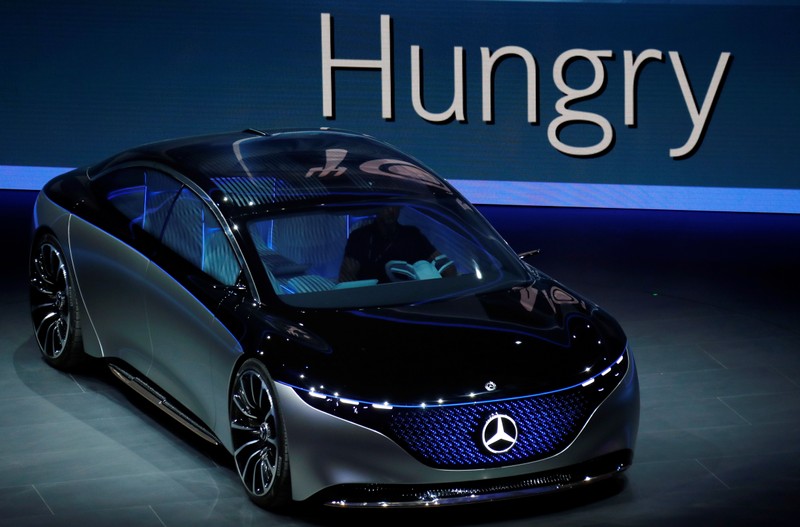
Mercedes-Benz Vision EQS is pictured at the 2019 Frankfurt Motor Show (IAA) in Frankfurt, Germany, September 10, 2019. REUTERS/Ralph Orlowski
September 10, 2019
By Edward Taylor and Joseph White
FRANKFURT (Reuters) – Mercedes-Benz and Porsche are showcasing curvaceous, high-end electric sports cars at the Frankfurt auto show as part of an industry effort to counter Tesla, avert billions in European pollution fines and defuse complaints from climate activists. Germany’s premium automakers are now marketing electric cars as their flagship models, a strategy which Daimler, Volkswagen <VOWG_p.DE> and BMW hope will lure customers away from gas-guzzling SUVs that could soon land them with hefty fines under new EU emissions rules.
“We have moved on from treating the electric car mainly as an engineering challenge. Now electric cars are getting sexy,” Gorden Wagener, Chief Design Officer at Mercedes-Benz parent Daimler told Reuters.
The Mercedes-Benz Vision EQS, a four door electric concept car, boasts fabrics made from recycled plastic bottles, a message which the company hopes will resonate with critics as well as car enthusiasts.
The global auto industry has struggled to placate activists and regulators in the wake of Volkswagen’s 2015 diesel emissions cheating scandal, while customers continue to buy ever larger, polluting vehicles.
Now a generation of new chief executives including Daimler’s Ola Kaellenius, BMW’s Oliver Zipse and Volkswagen’s Herbert Diess are attempting to recast the industry’s image with fresh modern designs and cars that pollute less.
“This is our idea of sustainable luxury,” Kaellenius said at the Frankfurt car show. “Electromobility is the core business for Mercedes-Benz.”
The Taycan, a low-slung four-door sports car with a range of 450 kilometers, is Volkswagen-owned Porsche’s attempt to inject desirability into premium electric cars, while the group’s mainstream brand, VW, is wooing customers with the ID3 compact.
FALSE DAWNS
Electric cars have seen many false dawns and German carmakers have struggled to win over customers accustomed to a recipe of high horsepower and large performance vehicles.
Mini offered customers an electric version of its city vehicle in 2009, BMW launched the carbon-fiber built i3 in 2013 and Mercedes sold an electric B-Class in 2014.
These models failed to stand out, and customers complained about high prices, long charging times, and inefficient batteries with limited ranges.
U.S.-based startup Tesla appealed to tech-savvy customers with its Model S in 2012, but has struggled to ramp up production volumes.
As a result, global sales of electric vehicles stood at only 1.26 million in 2018, just 1.5% of the 86 million passenger vehicles sold last year, according to JATO Dynamics.
BMW presented two electric sports cars in Frankfurt, the “Concept 4” and the “BMW Vision Next”, hoping that sporting credentials will woo customers that might ordinarily buy a combustion engined vehicle.
“Design can speed up change and the acceptance of new technologies,” BMW’s design chief Adrian van Hooydonk said at the carmaker’s press conference on Tuesday.
SHORT-SIGHTED
The EU is forcing a shift to lower emission cars by imposing a 37.5% cut in carbon dioxide pollution between 2021 and 2030, in addition to a 40% cut in emissions between 2007 and 2021.
The targets are getting harder to reach because customers are still buying heavy sport-utility vehicles (SUV).
Last year, CO2 emissions in the EU rose by 1.6% to an average 120.4 grams per kilometer. Volkswagen, the world’s largest carmaker by sales, expects SUVs to rise to 40% of its new car sales by 2020, up from 25% last year.
Julia Poliscanova, director of clean vehicles and emobility at campaigners Transport & Environment, said automakers had been short-sighted in promoting profitable, but polluting, SUVs.
“The problem they have now is their fault. They were late to invest in low and ultra low emission vehicles,” she said. As an intermediate step, BMW, Daimler, Audi and VW are rolling out a raft of large and small hybrid vehicles, including the Mercedes A-Class and BMW 1-series.
But critics say that is not enough to tackle climate change.
Porsche’s hybrid Cayenne SUV, for example, has a 340 horsepower six-cylinder engine – below the 550 horsepower Turbo S version’s eight cylinder unit but still far higher in output than sports car brand’s 356 SL Coupe which won the Le Mans race in 1951 with only 46-horsepower.
“These fake arguments brought forward by the industry are exactly the reason why we are taking to the streets,” said a spokeswoman for a protest group calling itself Sand in the Gearbox, which has called for a blockade of the Frankfurt show.
(Reporting by Edward Taylor; Editing by Mark Potter)

